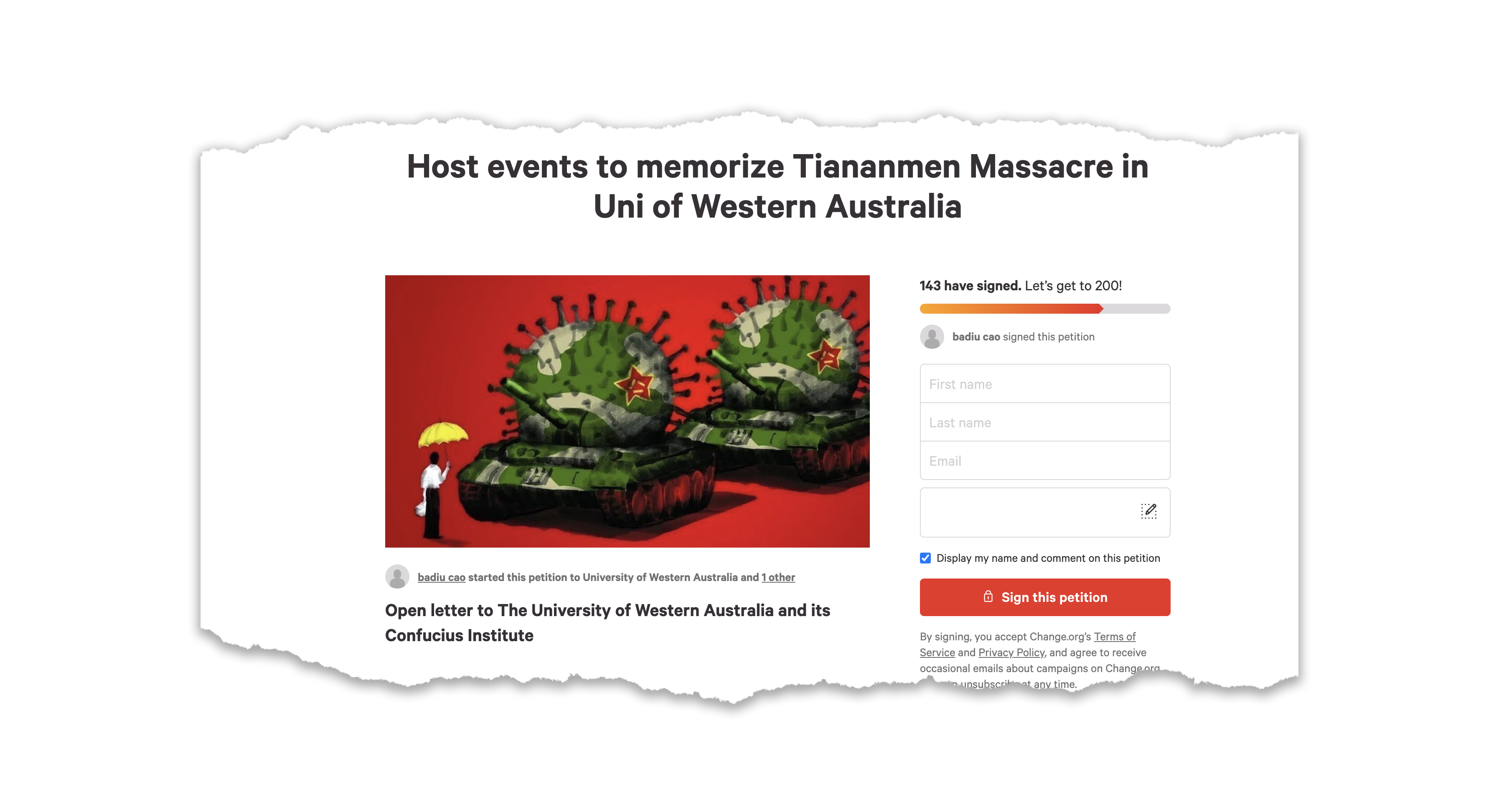Image Description: A change.org page, with the title being “Host events to memorize Tiananmen Massacre | Uni of Western Australia”. The image is a cartoon by Badiucao, The image is an adaptation of the famous ‘Tank Man’ photograph by Badiucao, where the tanks are also shown to be the coronavirus.
By Christine Chen
Neither the University of Western Australia nor the UWA-based Confucius Institute has responded to an open letter penned by prominent Chinese dissidents, academics, and Tiananmen Square survivors. The letter was published on Change.org and emailed to key contacts at the university eight days ago.
The letter is the result of an agreement made during an exchange on 20 August during an episode of ABC’s Chinese-language video series 直播澳洲 (‘Live Australia’), featuring a panel of guests discussing what international students from China could study while in Australia.
Among the guests was the Director of UWA’s Confucius Institute, Jiang Ying, and Badiucao, a political artist and Chinese dissident.
Approximately half an hour into the discussion, after Ying rejects Badiucao’s concerns over possible censorship from Confucius Institutes in Australia, Badiucao asks her: “Would you welcome an artist like me, who disagrees with the Chinese government, to come to your Confucius Institute at the University of Western Australia to organise some activities? Would you welcome academics to discuss issues such as the Tiananmen Square massacre or East Turkestan?”
“Yes, we would welcome them,” replied Ying.

Image Description: A screenshot from 直播澳洲 (‘Live Australia’).
Badiucao, 34, is a prolific and outspoken activist that some have called ‘China’s Banksy’. In a phone interview with Pelican from Melbourne, Badiucao said that “it’s very serious for the head of a Confucius Institute to keep their word, particularly because it was no casual conversation—it was said during a live-program broadcast.
He believes that “her words have weight,” and that “since Ms. Ying said we’re all welcome, it’s something I want to push.”
“However, I’m not naïve,” he added. “If I don’t push [the issue] in a public forum and through my letter, the CI may not follow through […] they might try to avoid sensitive and topics like this.”
In the open letter to UWA and UWA’s Confucius Institute he mentions, entitled “Host events to memorize Tiananmen Massacre in Uni of Western Australia” it states that “we welcome Jiang Ying’s agreement to host events about the Tiananmen Massacre.” “We like to help to organize and participate in the events and we believe it will help to ensure the nature of the events is objective and balanced.” Co-signed by fellow activists, academics, and survivors of Tiananmen Square, the letter also notes that the Tiananmen Square Massacre is “one of the most censored topics in China,” and “the knowledge of the movement […] is crucial to understand China’s modern political and social development.”
Indeed, the force used against pro-democracy protestors in Tiananmen Square on June 4, 1989, remains the most delicate and taboo subject in China today. It is reported that many Chinese citizens still know little of the events that transpired three decades ago, due to the Communist Party’s (CCP) continual censorship.
The CCP is also affiliated with the thirteen separate Confucius Institutes located across Australia, established to develop cross-cultural ties and academic cooperation. They have faced scrutiny over their funding programs and potential to exert ‘soft power’ (although no evidence has been found yet to substantiate these claims).
All eyes will be on UWA and the UWA-based Confucius Institute to see whether or not they decide to acknowledge the open letter. As it stands, Badiucao states that “UWA’s ignorance reveals [its] attitudes.” “I’ve been mentioning UWA on Twitter every day. They must have seen it.”
UWA’s record on discussing culturally-sensitive issues has been murky; in the past, it has struggled to navigate the interests of its Chinese students, who comprise an estimated 25.3% of its total international student population. In 2018, the UWA Student Guild controversially passed a motion to acknowledge “the negative impact that hosting the Dalai Lama at the university may have on the UWA Chinese student community”—a move that was criticised as “cowardly” by leading academics. (Similar sentiments were echoed again by the academic community last month, after the University of New South Wales removed social media posts calling for China to safeguard the human rights of Hong Kong protestors.)
UWA’s reticence would evince the palpable interdependence and the extent of the ‘academic cooperation’ that exists between it and China.
However, an explicit commitment to host events and guests that do not conform to CCP agenda, particularly at the Confucius Institute, would put its stance on China to the test. Nevertheless, it would also allow students to experience a more nuanced discussion of culturally significant topics. And with the Morrison government launching a parliamentary inquiry into foreign interference in Australian universities this week, a response would also be a positive step to clarify both the Institute and UWA’s commitment to free speech and academic debate.
Badiucao believes that “the university has a responsibility to address public inquiries and proposals in time.”
“We’ve waited a week, but I’m not giving up.”

